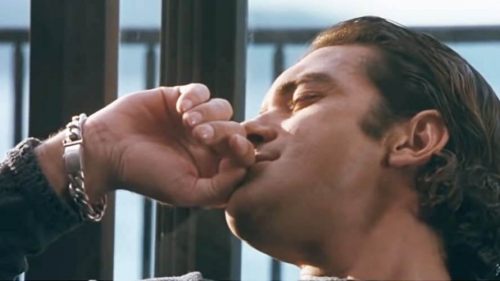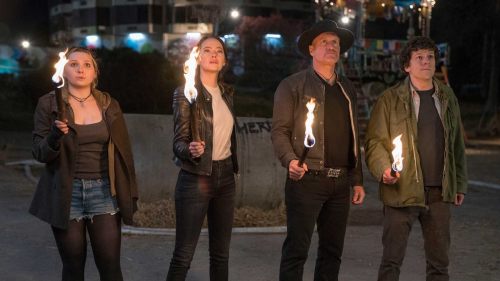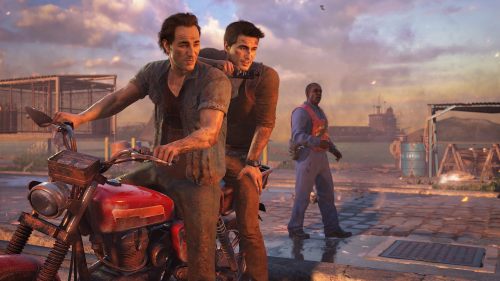Ruben Fleischer Raises ZOMBIELAND From The Dead For DOUBLE TAP
Zombieland: Double Tap is in theaters soon. Get your tickets here!
As badly as audiences want sequels to the movies they love, there’s something to be said for waiting for enough time to pass not only to generate some real appetite for a follow-up, but to allow a natural and compelling story to emerge that isn’t just a copycat of the original. Zombieland 2 is a film that moviegoers wanted almost immediately - the first movie is barely 80 minutes, hardly enough to qualify as a full meal - but director Ruben Fleischer and his four lead actors got busy in Hollywood becoming real-deal movie stars and ongoing staples of the silver screen. Meanwhile, writers Rhett Reese and Paul Wernick went off and created another funny, deeply self-referential franchise, Deadpool, that kept them busy as well.
But now that it’s finally here, Fleischer invited Birth.Movies.Death to an editing bay on the Sony Pictures lot where he’s putting the final touches on the film, a fast-paced road movie that reunites the characters for another series of bloody, brilliantly funny misadventures. “Finishing this was ten years in the making,” Fleischer himself said of the movie. “It's kind of a passion project for all of us who returned to Zombieland, between the cast, myself, the producers. We have so much love for the first one and had such a great experience on the first one that we’re excited to get the gang back together. Obviously it took a long time to do that, but I think it was worth the wait in that the movie we made will stand up to the original - which was our intention all along, to make something that we felt confident would be at least as good if not better than the original. So that's why it took so long.”
What elements of the mythology of the original movie were you particularly keen on flushing out or exploring in more depth?
For me it was about the characters more than what mythology we maintained. It was really more about the characters and where they're at in their lives. Because at the end of the day, it's kind of a family road trip comedy, like the first one, so it's about where the characters are at. But as we watch more scenes, maybe other things will come up or occur to me. I mean, obviously we maintain the zombie kills of the year - that was like a part of the mythology.
You talked about wanting to create a sequel that lived up to the original. How reliant were you on maybe starting with the script to create a strong foundation and then turning the movie to some extent over to those actors to recreate or elevate the chemistry that they showed in the first film?
On the first movie they improvised a lot as well, so that was something consistent. A lot of the funniest stuff in the first movie also was improvised moments. The entire Bill Murray sequence was pretty much unscripted, because he just does what he wants. But the cast was really exacting on the script. That's another reason I took ten years. We started the development of the script about five years ago, and there were multiple drafts. I would say Woody especially was the most discriminating, like he's said that of all the characters he's played, one of the most he gets asked about is Tallahassee and is there gonna be another Zombieland and just in his interactions with fans, he's felt a pressure to deliver if he were to do it again, to deliver a movie that can stand up.
So he probably held the script to the highest standard of everyone. And it took a long time to get it right on the page in order for them all to have the confidence to pull the trigger to move forward. Once we had a draft that we were all happy with, then we were able to find a window when they were all available. And even up until shooting, like at a table read prior to the shoot, Woody was still pushing us. And these are the writers of Deadpool. And the writers of the original are super talented guys, but he was just really demanding in a good way, just wanting to make sure that if we're going to do it, that we had full confidence in it. Like, I've worked on movies where you go in every day and you know that what you're shooting isn't very good to start with and then you have to figure it out, and that's way harder. The good thing in this case was that we had worked so hard to get every scene so strong and the relationships and characters so strong that we were only elevating it from a really good baseline. And so that was exciting, to be able to do that.
What during the process of developing the script told you you're on the right track?
We'd arrived on the basic structure pretty early as far as it being a movie where this teenager who'd been very sheltered wanted to go chase a boy, and there’s a hippie commune called Babylon where she goes with Berkeley. And so the movie was always kind of structured like The Searchers or something like that where the girl gets taken and then they have to go get her. And Madison was a character from the very first draft. But yeah, it was making sure that it was true to the voice of the original, and always trying to elevate it. It has to stand on its own but also evoke the first one, so it just takes time to get it right. But luckily Brett and Paul are so talented that they were able to thread the needle.
What does Zombieland look like in terms of the zombies themselves after ten years?
There's a whole theme in this about how the zombies have evolved. We meet a Homer, who's a dumber zombie, and then a Ninja who's a crafty zombie. And then we meet a Hawking who's a smart zombie. And then later in the movie we'll meet the threat of this film, which our heroes called T-800s, which are a stronger, more relentless and harder to kill. And so where they become pretty efficient and amazing at killing zombies up to this point, there's no real threat. It's not a big deal for them to kill zombies. But once they meet these T-800s, they realize that they may have met their match. So the stakes are raised a bit.
Were there any movies you watched as an influence or touchstone for what you wanted to do with Zombieland?
The first and most obvious was Shaun of the Dead, because they were the original zombie comedy. But then Zack Snyder's Dawn of the Dead and Danny Boyle's 28 Days Later were the reference points for me because the Romero stuff is so tonally different from where it has evolved to that I wanted to keep it feeling modern and contemporary, with fast zombies and viral stuff as opposed to the undead. But I watched every zombie movie there was to watch in preparation because prior to this movie I wasn't a big zombie guy so I kinda had to do my homework so I felt confident in telling the story. But for this one, I honestly didn't even go back and look at any zombie movies because the reference point for us was just the previous movie. Although I will say candidly, I think our zombies are a little slower with the exception of the T-800s.
What advantages were there in waiting ten years in terms of the story, the characters, the change in people's careers, whatever it is?
It wasn’t by design, but the fact that it was ten years gave purpose to the film, like ten years is a nice point at which to go back. If it had been seven, it would be kind of whatever, but ten just has a nice ring to it. It felt like there was enough time for some of the relationships to have changed. The fact that Abigail's not a little girl anymore is a big plot point. So I think allowing them to evolve on their own a little bit was good, and generated story. From a filmmaking perspective, I was excited about showing this world that was further degraded. I thought I Am Legend did a really great job of it, and Omega Man, that concept of an empty world. It was fun being able to live in a world that was just unoccupied and where you feel that passage of time - and you'll see it in the exteriors. We really worked hard to find locations that were overgrown and had felt like they'd been left, and then we embellished it, obviously, but it was really a fun challenge to try and find places that felt post-apocalyptic.
When you make your first movie, sometimes you don't know what you don't know, but what has the intervening years taught you either about that movie or just about filmmaking that you did want to bring to this one?
I think after the first one, there was a push to do a sequel soon thereafter. And I was like, no, I want to spread my wings and fly and do other stuff. And then I went and made a couple of movies and they didn't have the same critical or commercial or response that Zombieland did. And so I was like, you know what? That Zombieland thing was pretty great. I think I didn't realize just how lucky I was after that first movie, to have something so special and to have a cast that's so special. I mean, I've since worked with a variety of actors and I definitely appreciate how special and amazing and generous and cool and low key this cast is. And so that was the biggest draw for me, to put them all together and make sure anybody that we cast was cool and felt like their vibe would fit in. Because that was really important, the feeling onset. But we actually shot this movie in fewer days than the original and had a smaller second unit than the original, which is pretty crazy given how much bigger a movie it is - so many more characters to service and a much bigger third act.
What were the big changes for you since the first movie?
That’s the biggest thing. If you think about the ten years, Jesse and Emma were anonymous [then]. Like, we could go to any bar - I mean, Emma couldn't even get into bars because she was 20 when we shot the first movie and no one knew who they were. Now she's arguably one of the biggest movie stars in the world and has an Oscar. Jesse's been nominated, Woody I think has been nominated twice since the original. And I've definitely learned a lot. So we're all in much different places than we were on the first one. But I think that was part of what made it so special too, is because for each of us there's a real nostalgia to that time. And we had an amazing friendship and experience making the movie. And this is my third movie with Emma, my third movie with Jesse and third movie with Woody. I haven't done a movie without a member of the original cast of Zombieland - they've all been in every movie I've done. So that friendship is really important. There was just a lot of personal investment in returning to the world.



